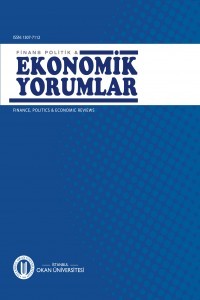İşgücü Piyasası Reformlarınınİşgücü Piyasası Geçişlerine Etkisi:Türkiye Örneği
Bu makalede, işgücü piyasası reformlarının işgücü piyasası performansını belirlemedeki rolünün Gelir ve Yaşam Koşulları Anketi’nin 2006-2010 panel verisi kullanılarak incelenmesi amaçlanmaktadır. Bu doğrultuda, istihdam, işsizlik ve işgücü dışında olma şeklindeki üç farklı işgücü piyasası durumu arasında bireylerin Markov geçiş olasılıkları hesaplanmaktadır. Sonuçlar, 2008 krizi ertesinde uygulmaya koyulan iyileştirici işgücü piyasası politika ve uygulamalarının krizin Türkiye işgücü piyasası üzerindeki olumsuz etkisini hafifletmede rol oynadığına işaret etmektedir. Bu sonuç özellikle hedeflenen genç ve kadınların oluşturduğu dezavantajlı gruplar için çok daha net bir şekilde ortaya çıkmaktadır.
Anahtar Kelimeler:
İşgücü piyasası Reformları, Markov Zincir Analizi, Türkiye İşgücü Piyasası, 2008 Küresek Ekonomik Krizi.
İşgücü Piyasası Reformlarının İşgücü Piyasası Geçişlerine Etkisi: Türkiye Örneği
This study aims at examining the role of labor market reforms in shaping the labor market performance in Turkey using the Income and Living Conditions Survey panel data for 2006-2010. To this end, we compute the Markov transition probabilities of individuals moving across three different labor market states: employment, unemployment and not in labor force. The results of the study reveal that the policy measures, in general, helped in alleviating the adverse effects of the 2008 economic crisis on the Turkish labor markets, particularly for the targeted disadvantaged groups such as youth and women.
Keywords:
Labor Market Reforms, Markov Transition Analysis, Turkish Labor Market, 2008 Global Economic Crisis,
___
- BALKAN, Binnur, Yusuf S. BAŞKAYA and Semih TÜMEN; (2014), “Evaluating the Impact of the Post-2008 Employment Subsidy Program in Turkey”, The Central Bank of the Republic of Turkey Working Paper No. 14/14, Internet Address: http://www.tcmb.gov.tr/wps/wcm/connect/51948d72-a604- 4b4d-8b81-2b748da7cb58/WP1414.pdf?MOD=AJPERES& CACHEID=ROOTWORKSPACE51948d72-a604-4b4d-8b81- 2b748da7cb58, Date of Access
- BERNABE, Sabine and Marco STAMPINI; (2009), “Labour Mobility During Transition: Evidence From Georgia”, Economics of Transition, 17(2), pp.377-409.
- BIGSTEN, Arne, Taye MENGISTAE and Abebe SHIMELES; (2007), “Mobility and Earnings in Ethiopia’s Urban Labor Markets: 1994–2004”, World Bank Policy Research Working Paper Series No. 4168, Internet Address: http://documents.
- worldbank.org/curated/en/2007/03/7459297/mobility-earningsethiopias-urban-labor-markets-1994-2004 BOSCH, Mariano and William F. MALONEY; (2010), “Comparative Analysis of Labor Market Dynamics Using Markov Processes: An Application to Informality”, Labour Economics, 17(4), pp. 621-631.
- CANAVIRE-BACARREZA, Gustavo J. and Luis. F. L. SORIA; (2007), “Unemployment Duration and Labor Mobility in Argentina: A Socioeconomic-Based Pre- and Post-Crisis Analysis”, CEDLAS Working Papers No. 0054, Internet Address: http:// sedici.unlp.edu.ar/bitstream/handle/10915/3613/doc_cedlas54.pdf.txt;jsessionid=8FA231A546C145DFAD1BA15ED3A 3E2BD?sequence=2
- CHRISTODOULAKIS, George A. and Emmanuel C. MAMATZAKIS; (2010), “Labour Market Dynamics in Greek Regions: a Bayesian Markov Chain Approach Using Proportions Data”, Review of Economic Analysis, 2(1), pp. 32-45.
- CUESTA, Jose and Camilo BOHORQUEZ; (2011), “Labor Market Transitions and Social Security in Colombia”, World Bank Policy Research Working Paper Series No. 5650,InternetAddress:https://openknowledge.worldbank.org/ bitstream/handle/10986/3413/WPS5650.txt?sequence=2
- DURYEA, Suzanne, Gustavo MARQUEZ, Carmen PAGES and Stefano SCARPETTA; (2006), “For Better or For Worse? Job and Earnings Mobility in Nine Middle and Low Income Countries”, in Susan M. COLLINS and Carol L.
- GRAHAM (Ed.), Brookings Trade Forum 2006: Global Labor Markets, Washington D.C.: Brookings Institution Press, pp.187-209.
- ERCAN, Hakan; (2007), Türkiye’de Gençlerin İstihdamı, Ankara: ILO Office for Turkey.
- ERCAN, Hakan, Erol TAYMAZ and Erinç YELDAN; (2010), Crisis and Turkey: Impact Analysis of Crisis Response Measures. Ankara: ILO Office for Turkey
- ISSN: 1307-7112
- Başlangıç: 1963
- Yayıncı: İstanbul Okan Üniversitesi
Sayıdaki Diğer Makaleler
Sürdürülebilir Kalkınma ve Ekolojik Ayak İzi
İşgücü Piyasası Reformlarınınİşgücü Piyasası Geçişlerine Etkisi:Türkiye Örneği
Elif Öznur ACAR, Burak GÜNALP, Seyit Mümin CİLASUN
Türkiye’de CO2 Salınımları EnerjiTüketimi ve Ekonomik Büyüme İlişkisi
Hakan ÇETİNTAŞ, İbrahim Murat BİCİL, Kumru TÜRKÖZ
Çalkantılı Zamanlarda Finansal Yeniliklerin ve Kurumların Yükselişi: Ortaçağ Floransa’sı Vakası
Türkiye’de Altın ve Altına Dayalı Yatırım Araçlarının Karşılaştırmalı Performans Analizi
